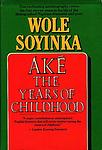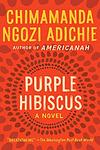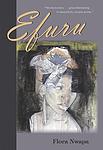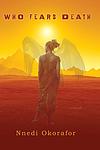The Greatest Nigerian "Social & Cultural Fiction" Books of All Time
Click to learn how this list is calculated.
This list represents a comprehensive and trusted collection of the greatest books. Developed through a specialized algorithm, it brings together 300 'best of' book lists to form a definitive guide to the world's most acclaimed books. For those interested in how these books are chosen, additional details can be found on the rankings page.
Genres
Social & Cultural Fiction is a literary category that encompasses novels and stories that delve into the complexities of society and culture, exploring themes such as class, race, gender, and identity within specific social contexts. These narratives often provide a lens through which readers can examine the intricacies of human relationships and the impact of cultural norms and societal structures on individuals and communities. By offering a fictional yet reflective portrayal of real-world social dynamics, this genre invites readers to gain a deeper understanding of the diverse experiences that shape our world. Authors in this category frequently use their characters and settings to comment on contemporary issues, challenge prevailing ideologies, and provoke thought about the possibility of social change, making Social & Cultural Fiction a powerful tool for empathy and a mirror for the ever-evolving human condition.
Countries
Date Range
Reading Statistics
Click the button below to see how many of these books you've read!
Download
If you're interested in downloading this list as a CSV file for use in a spreadsheet application, you can easily do so by clicking the button below. Please note that to ensure a manageable file size and faster download, the CSV will include details for only the first 500 books.
Download-
1. Things Fall Apart by Chinua Achebe
This novel explores the life of Okonkwo, a respected warrior in the Umuofia clan of the Igbo tribe in Nigeria during the late 1800s. Okonkwo's world is disrupted by the arrival of European missionaries and the subsequent clash of cultures. The story examines the effects of colonialism on African societies, the clash between tradition and change, and the struggle between individual and society. Despite his efforts to resist the changes, Okonkwo's life, like his society, falls apart.
-
2. Half of a Yellow Sun by Chimamanda Ngozi Adichie
The novel is set in Nigeria during the Biafran War, exploring the impact of the conflict on the lives of its characters. The story is told from the perspective of three characters: a young houseboy, a radical university professor, and the professor's wealthy lover. The narrative delves into themes of love, race, and war, offering a vivid depiction of the horrors of conflict and the resilience of the human spirit.
-
3. The Famished Road by Ben Okri
The novel centers around the life of an abiku, a spirit child, who resides in the bustling city of Lagos. Despite numerous attempts to return to the spiritual world, the boy is tethered to the physical realm through the love of his mother. As he navigates through the political unrest and poverty of post-colonial Nigeria, he experiences a series of surreal and mystical encounters, all while wrestling with the pull of the spirit world. The narrative is a blend of reality and the supernatural, providing a unique perspective on the struggles and complexities of human life.
-
4. Americanah by Chimamanda Ngozi Adichie
The novel follows a young Nigerian woman who emigrates to the United States for a university education. While there, she experiences racism and begins blogging about her experiences as an African woman in America. Meanwhile, her high school sweetheart faces his own struggles in England and Nigeria. The story is a powerful exploration of race, immigration, and the complex nature of identity, love, and belonging.
-
5. Second-class Citizen by Buchi Emecheta
"Second-Class Citizen" is a poignant narrative about a young Nigerian woman, Adah, who dreams of getting an education and moving to the United Kingdom. Despite cultural and societal obstacles, Adah manages to achieve her dream but is met with more hardship as she faces racial discrimination, an abusive marriage, and the struggle of raising five children in a foreign land. Through her resilience, she continues to strive for a better life, depicting the struggles of immigrants and the strength of women.
-
6. The Joys Of Motherhood by Buchi Emecheta
"The Joys of Motherhood" is a poignant and powerful novel that explores the life of Nnu Ego, a Nigerian woman who struggles to find fulfillment and happiness in the traditional role of motherhood. Set against the backdrop of colonial Nigeria, the story delves into themes of gender inequality, cultural expectations, and the sacrifices mothers make for their children. Through Nnu Ego's experiences, the author offers a thought-provoking examination of the complexities and contradictions of motherhood in a rapidly changing society.
-
7. Ake: The Years Of Childhood by Wole Soyinka
"Ake: The Years of Childhood" is a memoir that chronicles the early years of a Nigerian boy growing up in the town of Ake. Set in the 1940s, the book vividly captures the author's experiences, from his close-knit family life to his encounters with colonialism and the struggle for independence. Through his insightful and lyrical prose, the author takes readers on a nostalgic journey filled with rich cultural traditions, humorous anecdotes, and poignant reflections on the complexities of childhood.
-
8. Purple Hibiscus by Chimamanda Ngozi Adichie
"Purple Hibiscus" follows the story of a 15-year-old Nigerian girl, Kambili, and her older brother Jaja, who live a privileged life in Enugu. However, their father is a religious fanatic and a domestic tyrant. The siblings are sent to their Aunty Ifeoma's home, a university professor, who provides them a taste of freedom and shows them a different way of life outside their father's oppressive rule. The novel explores themes of colonialism, religious fanaticism, and the post-colonial political situation in Nigeria.
-
9. Idu by Flora Nwapa
This novel explores the life of Idu, a devoted wife whose existence becomes deeply intertwined with that of her husband, Amadi, who is the love of her life. Set against the backdrop of traditional Igbo society in Nigeria, the story delves into themes of love, loss, and the societal expectations placed upon women. When tragedy strikes and Idu is faced with Amadi's untimely death, her world is shattered, leading her to challenge the conventions and expectations of widowhood. Her profound connection to her husband transcends the physical realm, showcasing the depth of her love and commitment. Through Idu's journey, the narrative presents a poignant exploration of the roles of women, the significance of tradition, and the power of love to transcend the boundaries of life and death.
-
10. Efuru by Flora Nwapa
The novel is a poignant exploration of the life of a strong and independent woman in a traditional Igbo community in Nigeria. The protagonist, after whom the book is named, is admired for her beauty, intelligence, and wealth, but she faces personal tragedies and societal pressures. Despite her successes in business and her contributions to her community, she struggles with the expectations placed on her as a woman, particularly with respect to marriage and childbearing. The narrative delves into themes of feminism, tradition, and the role of women in a changing society, as the protagonist navigates her relationships and seeks fulfillment in a culture that often values women primarily through their husbands and children.
-
11. The Bride Price by Buchi Emecheta
"The Bride Price" is a novel that explores the life of a young Nigerian girl who, despite her father's disapproval, dreams of furthering her education. After her father's death, she is forced into an arranged marriage due to cultural traditions, but she defies the system and elopes with her lover. However, the consequences of unpaid bride price haunt her, leading to a tragic ending. The book highlights the clash between traditional African values and modern aspirations, the struggles of women in patriarchal societies, and the impact of colonialism on African cultures.
-
12. The Stillborn by Zaynab Alkali
"The Stillborn" is a poignant narrative that explores the lives of women in a traditional African society, focusing on their struggles, resilience, and the quest for personal identity. The story delves into the complexities of polygamy, cultural expectations, and the impact of modernity on rural communities. Through the experiences of its female protagonists, the novel highlights the challenges faced by women in their pursuit of education, autonomy, and fulfillment in a male-dominated environment, ultimately offering a critique of the societal norms that stifle their growth and the transformative power of self-awareness and communal support.
-
13. Who Fears Death by Nnedi Okorafor
This novel is a coming-of-age narrative set in a post-apocalyptic Africa. It follows the journey of a young woman born from a violent act, who is prophesied to bring an end to a brutal regime. As she grows, she discovers her magical abilities and must learn to control them in order to fulfill her destiny. The narrative explores themes of race, gender, and power, while incorporating elements of African mythology and culture.
-
14. Anthills Of The Savannah by Chinua Achebe
This novel explores the political turmoil and corruption in a fictional West African country following a military coup. Through the lives of three childhood friends who have risen to positions of power and influence, the narrative delves into themes of leadership, betrayal, and the quest for democracy in a post-colonial African society. As the country teeters on the brink of chaos, the characters' personal and political dilemmas reflect the broader struggles of a nation grappling with its identity and governance. The story is a poignant commentary on power, the complexities of freedom, and the enduring human spirit amidst societal upheaval.
-
15. Interpreters by Wole Soyinka
"Interpreters" weaves together the stories of a group of young Nigerian intellectuals navigating the complexities of postcolonial life in the 1960s. Through their intertwined lives, the novel explores themes of corruption, societal change, and the search for cultural identity. The characters, who work as interpreters both literally and metaphorically, strive to find their place in a country where the traditional and the modern are in constant tension. The narrative delves into their personal and professional struggles, shedding light on the broader political and social issues facing the newly independent nation.
-
16. No Longer At Ease by Chinua Achebe
The novel centers on a young Nigerian man, educated in England, who returns to his home country with high ideals and a desire to contribute to the development of a post-colonial, independent Nigeria. However, he finds himself trapped between the expectations of his traditional Igbo community and the corrupt practices entrenched in the government bureaucracy. As he struggles to navigate the complex moral landscape, his integrity is compromised, leading to his eventual downfall. The story is a poignant exploration of the challenges of modernity and the clash between traditional values and the temptations of a rapidly changing world.
-
17. Say You’re One of Them by Uwem Akpan
"Say You're One of Them" is a collection of five stories, each set in a different African country, that provides a heart-wrenching look into the lives of children trying to survive in the face of unimaginable hardship. The stories deal with issues such as child trafficking, religious conflict, and poverty, presenting the harsh realities of life in Africa through the innocent eyes of children. The book is a powerful exploration of the resilience and hope of these children in the face of adversity.
-
18. The Death of Vivek Oji by Akwaeke Emezi
The novel unfolds the mysterious circumstances surrounding the death of a young Nigerian named Vivek Oji. Through a non-linear narrative and multiple perspectives, the story delves into Vivek's complex identity and the struggles with gender, family expectations, and societal norms in a contemporary Igbo community. As the characters grapple with their grief and the secrets Vivek left behind, the novel explores themes of love, acceptance, and the liberating power of embracing one's true self. The poignant tale reveals the transformative impact Vivek had on the lives of those around him, even as they come to terms with the enigmatic nature of his life and untimely death.
Reading Statistics
Click the button below to see how many of these books you've read!
Download
If you're interested in downloading this list as a CSV file for use in a spreadsheet application, you can easily do so by clicking the button below. Please note that to ensure a manageable file size and faster download, the CSV will include details for only the first 500 books.
Download
















